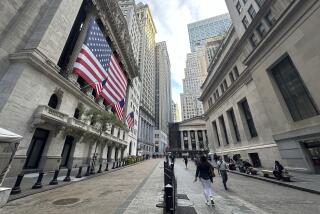Strong Economic Signs Likely to Inflate Worries
More signs of strong economic growth may boost stocks this week, but concerns about inflation and rising interest rates could put a damper on a summer rally before the season officially starts.
Reports on industrial production, retail sales, housing starts and regional manufacturing are expected to show a strong economy. But rising rates have led to concerns about the housing market and, more important, how fast the Federal Reserve will move to subdue inflation.
A 1.2% increase is forecast for U.S. retail sales in May, boosted by purchases at automobile dealerships and department stores, according to the median estimate in a Bloomberg News survey in anticipation of today’s report from the Commerce Department. The rise is the seventh in the last eight months.
Industrial production may have risen 0.8% for a second month, a survey showed in advance of Federal Reserve statistics Wednesday.
“There’s no longer any doubt about the sustainability of the U.S. economic recovery,” said Richard Berner, chief U.S. economist at Morgan Stanley in New York. “Improving labor markets are creating a virtuous cycle, generating more than enough income to sustain consumer spending.”
The consumer price index for May will be released Tuesday. Economists surveyed by Reuters expect it to show a gain of 0.4%. Those surveyed by Bloomberg News predict a 0.5% jump.
Both surveys indicate that it will be one of the most closely watched economic reports of the week. A higher number for the overall CPI for May could increase pressure on the Federal Reserve to lift interest rates.
Greenspan said last week that Fed policymakers would do “what is required” to keep inflation in check.
Compared with the same month last year, prices paid by consumers for goods and services excluding energy and food were probably 1.8% higher in May, according to the Bloomberg survey. The year-over-year increase had dropped in January to 1.1%, matching the smallest gain in 43 years.
“We believe the Fed has an inflation comfort zone of about 1.5% to 2.5%,” said Ethan Harris, chief U.S. economist at Lehman Bros. Inc. in New York.
Central bankers begin a two-day meeting June 29, and investors expect them to raise the overnight bank lending rate a quarter of a percentage point from 1%, where it’s been for the last year.
In general, economic data this week will show a strong economy, but there are concerns about how higher interest rates will affect the housing industry, said John Caldwell, chief investment strategist at McDonald Financial Group, part of KeyCorp.
“The question that investors should be asking themselves right now is: ‘With the Greenspan comments ... have they set the stage for a less measured pace?’ ” he said.
All three major U.S. stock market gauges finished last week higher, keeping alive a rally that began a month ago.
A report due this week on housing starts is expected to show that home builders broke ground at a seasonally adjusted annual rate of 1.95 million units, down from a 1.96-million-unit pace in April. New-building permits are expected to come in at an annual pace of 1.97 million.
Higher fuel prices and the Iraq war are chipping away at consumer sentiment and hurting President Bush in the polls. The University of Michigan is forecast to report Tuesday that its confidence index this month held close to the seven-month low of 90.2 in May. A reading of 90.8 is forecast for June’s preliminary index.
More to Read
Inside the business of entertainment
The Wide Shot brings you news, analysis and insights on everything from streaming wars to production — and what it all means for the future.
You may occasionally receive promotional content from the Los Angeles Times.










